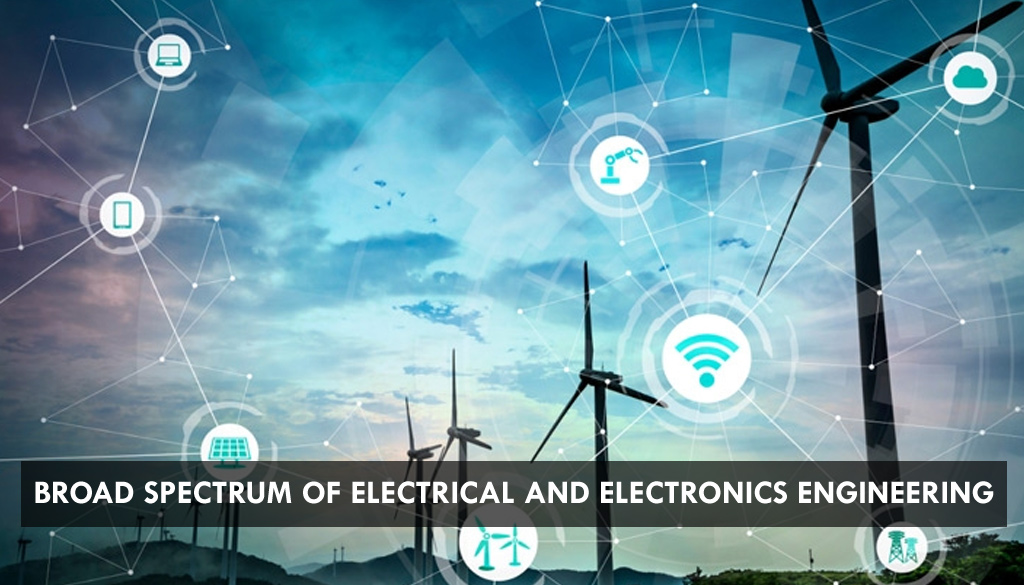
BROAD SPECTRUM OF ELECTRICAL AND ELECTRONICS ENGINEERING
Every new technical innovation advances the discipline of engineering. Emerging areas in electrical engineering are particularly fascinating. Let’s examine some of the most recent electrical engineering breakthroughs and explain how and why they are so important.
Renewable Energy
Renewable energy or Green energy is an energy source with an unlimited supply. Solar energy, wind energy, hydroelectric energy, and geothermal energy are a few examples. The advantages of widespread use of these energy sources are obvious such as reduced environmental impact, labor-intensive job development, lower carbon dioxide emissions, and an unlimited supply. The developing sustainable energy technologies are:
- Concentrating solar power technology
- Floating wind turbines
- Printable organic solar cells
- Biomass gasification technology for power generation
- Tidal energy technologies
- Microbial Fuel Cell (MFC) technology
According to the Paris Agreement for National Determined Contribution, the goal established by India is to generate electricity from green sources to around 57% of the total power generation, i.e., 175 GW till 2022 and 450GW till 2030.

Smart Grids
With the introduction of smart grids, more commercial and industrial consumers can generate their electricity and even sell the excess. This advancement has altered the electricity distribution infrastructure.
Smart grids have elegant gadgets throughout the infrastructure, including in homes, workplaces, and industrial plants. These smart devices collect and provide data that enables industrial facilities to assess patterns and make more functional, efficient, and cost-effective electricity usage decisions. The gadgets can foresee spikes in usage and prepare for that, as well as, detect outages immediately and alert personnel who can rectify them.
Smart grids provide the facility of communication between the Power Company, distributors, and end-users, increasing efficiency and lowering costs. Smart grids adopt the following skills to interface with grids
- Measurement and Sensors
- Smart Meters
- Communications Systems and Networking
- Supervisory Control and Data Acquisition Systems (SCADA)

Ev Technology
Electric vehicles have repetitively grown in popularity, and because of their energy efficiency and lower carbon emissions, they are undoubtedly the vehicles of the future. Tesla, for example, recently surpassed a market capitalization of $100 billion, making it the first publicly traded automobile producer in the United States to do so. According to industry experts, the number of electric vehicles on the road in the world will have risen to 18.7 million by 2030, up from around 1 million at the end of 2021. Consumers may expect the introduction of many new enhancements, such as more powerful, longer-lasting batteries, upgraded charging technology, fully functioning autonomous driving, and solar-powered vehicles. Heavy investments are done by renowned companies in electric vehicle technology to improve on the aforementioned parameters. There’s even a chance that electric planes will become a reality. Major skill enhancements arena in EV Technology are:
- Design and Architecture Control of Electric Vehicle
- Electric Vehicle charging
- Energy Storage and Battery Management System
- Testing and Validation

Artificial Intelligence
In an industrial application, artificial intelligence (AI) can assist electrical engineers in performing their duties easier. They make it possible to make several substantial advances to engineering tasks including:
- Developing AI and machine learning systems for more advanced and capable machinery
- Developing complex data analysis algorithms
- Creating new codes or improving existing ones
- Image processing

Robotic Process Automation
Many businesses are already interested in robotic process automation (RPA) technology because of its impact on business results with a quick return on investment (RoI). Some of the application areas of RPA are: Leveraging RPA and AI in Accounts Payable Process, Electronic Medical Record (EMR) or Practice Management (PM), and transportation management system. The successful RPA programs provide the following capabilities:
- Automation development
- Integration features
- Control panel/dashboard
- Enterprise IT software development life cycle
- Hosting and cloud
- Security, compliance, and governance
- Artificial intelligence, machine learning, and natural language processing

Opportunities For Electrical And Electronics Engineers In These Emerging Areas
The cutting-edge skills and intellectual simulation knowledge acquired in multi-disciplinary areas enable today’s electrical engineers to perform in a wide variety of areas. They will not only be restricted to power generation, distribution, and transmission but will have a bright future in the areas of designing electrical vehicles to solar wind and Microgrids. There will be enormous job opportunities in the companies related to the above fields such as Waaree, Tata Motors, Adani, Microtek Solar Solutions, Mahindra & Mahindra Limited, Maruti Suzuki India Ltd., Ashok Leyland Ltd., Olectra Greentech Ltd., ABB, Siemens, Mitsubishi Electric India, etc., to name a few.



